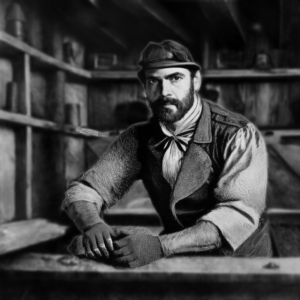
Charles “Happy” Smith. A cheerful nickname for a man who met a tragic end. Found dead in his miner's shack, a bullet and a brutal blow marking his final moments.
Love triangles, jealous rage, and a witness who falls silent. Was it a crime of passion or something more calculated? Was justice served, or did the real killer slip away? We’re digging into the dark secrets of a mining town and question the details behind Happy Smith's demise.
TRANSCRIPT
In the shadows of Tonopah's Montana mine in 1906, Charles "Happy" Smith was an ore-sorter—a role demanding precision and a keen understanding of the earth's treasures.
Yet, beyond the mine's depths, Happy found solace in the bustling nightlife of Tonopah. Thursday evenings often saw him amidst the glitter of casinos, drawn to the allure of dance-hall girls. Among them, Jessie Case captured his attention and affection.
Employed by the casinos to entice patrons into buying drinks, dance-hall girls like Jessie operated under a clear business arrangement, though not always transparent to their admirers.
After a jovial Thursday night, no one heard from Happy on Friday, and friends grew concerned by Saturday. On Sunday, one friend ventured to check on him, only to make a grim discovery: Happy lay dead in his solitary cabin. A bullet through his ear and a savage blow to his forehead meant a brutal end—a stark contrast to the tranquil nights at his cabin.
As the dust settled, suspicion swirled around a man named A.E. Bell and Ms. Jessie Case—who may have been part of a bizarre love triangle. Sheriff's scrutiny landed heavily on them, suspecting a jealous motive behind the crime. What had begun as a romance between Happy and Jessie seemed to sour with the arrival of Bell—a newcomer whose presence stirred jealousy and resentment.
The investigation led to Happy's cabin, where Mrs. Harrison, a neighbor, provided crucial insights into the night of the murder. She recounted seeing a man and woman—presumably the suspects—engaged in a heated argument, ending in a chilling thud.
Evidence pointed to a confrontation rather than a peaceful slumber, raising questions that the ensuing legal process struggled to answer definitively. Bell and Jessie, adamant in their innocence, challenged their detention through legal channels, but procedural obstacles kept them behind bars.
Just as the case seemed poised for deeper revelations, Mrs. Harrison's health faltered, halting the trial and leaving many unanswered questions in its wake.
While jealousy loomed large as a potential motive, lingering doubts suggested deeper currents: financial entanglements, past conflicts, or unseen pressures at play. Was Bell merely a customer of the casino, or did he have deeper ties to Jessie?
Mrs. Harrison's sudden decline hinted at undisclosed pressures or withheld truths, complicating an already murky investigation. Was Happy's demise an isolated tragedy or part of a wider conspiracy lurking within Tonopah's mining or nightlife community?
These unresolved mysteries invite exploration at the Montana mine in Tonopah's Historic Mining Park—a place where Happy spent his final days, and where clues to this enigmatic chapter in local history may yet linger.
Also check out:
Tonopah Bonanza, Charles Smith article, August 18, 1906
Check out our full podcast archive here.


